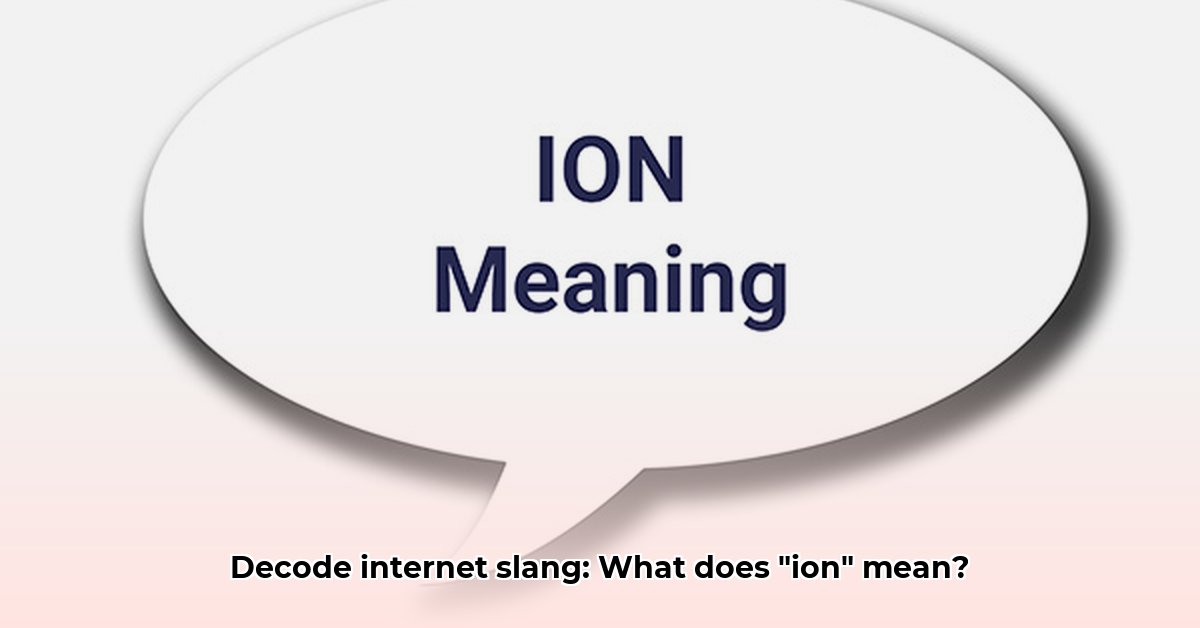Seen “ion” in a text and wondered what it means? Don’t worry, you’re not the only one! It’s a common word online, especially among younger folks. This guide breaks down everything you need to know about “ion,” from its popular meaning to its uses. We’ll explore its origins, show you examples, and give you tips on using it correctly so you can chat online without any confusion. Let’s get started and crack the code of “ion”!
Decoding “ion”: More Than Just a Chemical Term
The term “ion” extends beyond science, infiltrating the digital world as a slang term, particularly in online communication. But what does “ion” mean text? It’s essential to understand its multiple meanings in today’s digital landscape.
“I Don’t”: The Most Common Meaning
The most frequent use of “ion” is as a shortened form of “I don’t” or “I don’t know.” It’s commonly seen in texting, online chat, and social media. This usage is especially prevalent among younger generations who seek quick and efficient ways to communicate.
Examples:
- “Are you going to the party tonight?” “Ion know.”
- “Did you finish your homework?” “Ion even start.”
- “Do you want pizza or tacos?” “Ion care.”
This meaning of “ion” is rooted in the casual pronunciation of “I don’t” in some dialects, where the “d” sound is dropped, and the phrase is compressed.
“In Other News”: Shifting the Conversation
Less frequently, “ion” can stand for “in other news.” This usage serves as a transitional phrase to change the subject in a conversation. Think of it as a digital way to say “anyway” or “speaking of which.”
Examples:
- “The weather is terrible today. Ion, did you see that new movie trailer?”
- “I had a really rough day at work. Ion, I got a promotion.”
In this context, “ion” signals a shift in focus to a new topic, often unrelated to the previous one.
Context is Everything: How to Decipher the Meaning
Understanding the context is crucial to determine the intended meaning of “ion.” Consider the surrounding words, the tone of the conversation, and the relationship between the speakers.
- Informal settings: In casual conversations with friends or acquaintances, “ion” usually means “I don’t.”
- Formal settings: Avoid using “ion” in professional emails, academic papers, or any formal written communication.
- Topic shifts: If the speaker is introducing a new subject, “ion” likely means “in other news.”
Here’s a table summarizing how context influences “ion” meaning:
| Context | Likely Meaning | Example |
|---|---|---|
| Texting a friend | “I don’t” | “Ion want to go to school today.” |
| Social media comment | “I don’t know” | “Ion know what to wear to the party.” |
| Formal email | (Avoid using) | N/A |
| Introducing a new topic | “In other news” | “Ion, did you hear about the new restaurant?” |
Regional and Cultural Variations
The use and interpretation of “ion” can vary across different regions and subcultures. It’s more prevalent in some areas than others, and its meaning may be slightly different depending on the community. Pay attention to how people use “ion” in your social circles to get a better understanding of its local nuances.
Who Uses “Ion”?
“Ion” is most commonly used by younger generations, particularly teenagers and young adults, in informal online settings. It’s often seen in text messages, social media posts, online gaming chats, and other digital communication channels. While older generations may be less familiar with this slang term, it’s becoming increasingly widespread as digital communication continues to evolve.
Tips for Using “Ion” Correctly
- Know your audience: Use “ion” only with people who are familiar with the term and won’t misinterpret it.
- Consider the context: Make sure the meaning of “ion” is clear from the surrounding words and the overall tone of the conversation.
- Avoid overuse: Using “ion” too frequently can make your writing sound repetitive or lazy.
- Be aware of regional variations: The meaning and usage of “ion” may differ in different areas or communities.
The Evolution of Internet Slang
“Ion” is just one example of how language evolves in the digital age. As technology advances, new slang terms and abbreviations emerge to meet the changing needs of online communication. Staying up-to-date on these trends can help you better understand and engage with others in the digital world.
Understanding how “ion” is used can help you to understand what the person on the other side of the screen is meaning to say.
















